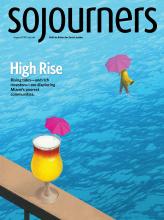I JUST STUMBLED onto the whole Rob Bell thing in the past few weeks. Before that, I knew the name, and I vaguely associated it with some headlines about the founder and pastor of the Mars Hill Bible Church in Michigan becoming evangelical non grata for writing a book, Love Wins, in which he said some thought-provoking things about the afterlife.
That was it. Then, while researching something else, I watched the new documentary The Heretic (directed by Andrew Morgan, available on Amazon and iTunes). I was astounded. A 40-something guy was on stage, alone, dressed in what seemed like an ill-fitting hipster costume: Cropped pants, shoes with no socks, and a weirdly undersized jacket. He held just a wireless mike and talked, to a theater filled with 500 or so paying customers, about Jesus and the Bible and what it all really means. This apparently happens all over the country, and all over the English-speaking world. This was a revelation to me.
Read the Full Article

